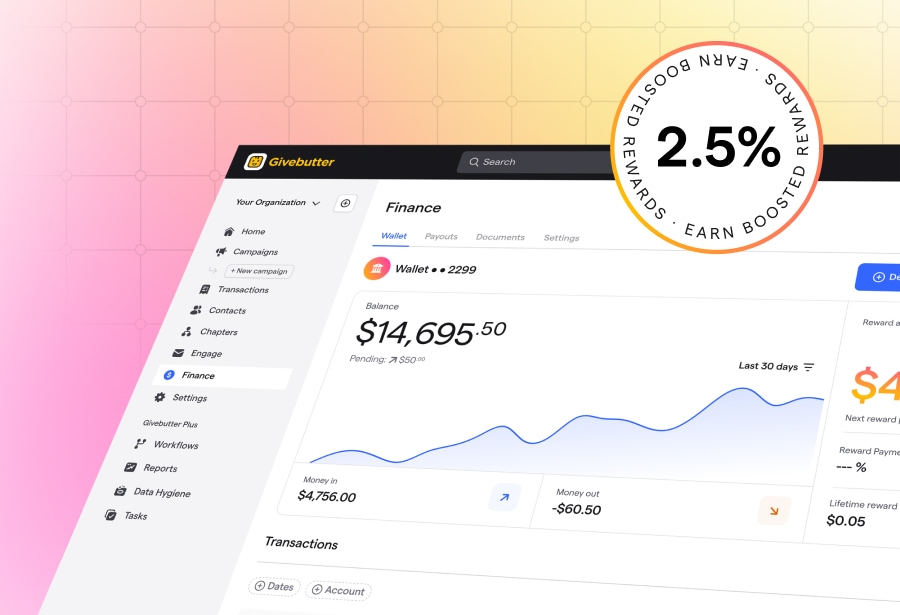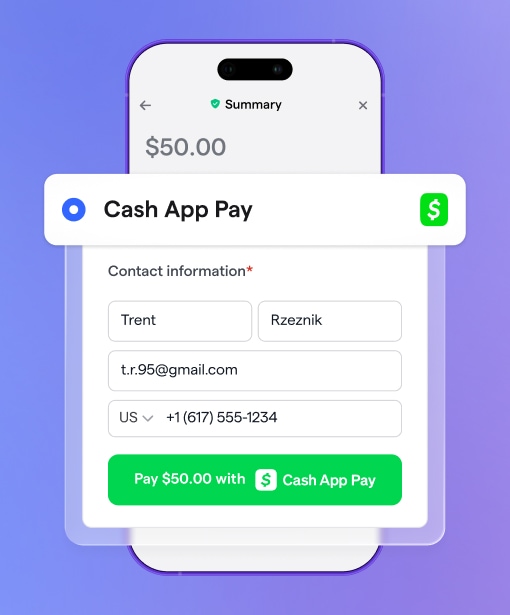Table of contents
Table of contents
Givebutter's Director of Community and Partnerships Floyd Jones got to sit down with Dr. Jackie Bouvier Copeland, the founder and CEO of Women Invested to Save the Earth (The WISE Fund), and founder and curator of Black Philanthropy Month.
Recently recognized by Congress as a history maker for her innovative civic contributions, Dr. Copeland was also named one of the world's top one hundred philanthropy leaders by Philanthropy Unbound.
Full interview with Dr. Jackie Bouvier Copeland
Watch the full interview, filmed in August 2022, and check out highlights from the conversation in the transcript below!
For more information about how you can get involved in this inspiring movement, head over to Givebutter’s Black Philanthropy Month hub →
Transcript highlights
Edited for brevity and clarity
Dr. Copeland: It's the 11th official year of the Black Philanthropy Month summit, but this entire movement was in a kind of incubation period since about 2000. We did three test summits, and that whole experience morphed into what was formally named Black Philanthropy Month on August 10, 2011.
Floyd Jones: It is a true testament to your pioneering spirit, but also the resiliency that it requires to continue to forge these new pathways and provide the necessary resources for marginalized people and groups. I always think about the spirit of ubuntu whenever I talk to you: "I am because you are." Because you decided to walk, people like me came and can continue to move forward. So I feel immensely grateful.
Dr. Copeland: This was also a community effort. Definitely, there's a catalyst, there's a visionary. There's the person who will do almost anything to make sure it happens, and I'm that person. But we wouldn't be here today except for many people—a lot of women, Black women from 30 countries, and allies who made that prehistory and that 2011 kickoff possible. Then all of the new leaders who joined to help keep it going. I just always have to give props to the community.
Floyd Jones: Tell me about the power of community in terms of your work at large, but also as it pertains to Black Philanthropy Month. How have you seen community really fuel this movement?
Dr. Copeland: The genesis of this is really my working in philanthropy in various countries, throughout the U.S., and growing up in the Black community where philanthropy or giving is such an ingrained part of the DNA. Sometimes people don't even have a word for it. They're colloquialisms like: Giving back. Giving Black. Help. Don't forget where you came from.
And so working in the formal philanthropy field, there was this myth that continues, that somehow Afro-descendant or Black people, are the only group of people in the world who don't give. That somehow we're the supplicants of the world. And at the same time, even back when I dreamed this, there was research for at least 20 years at that time, reaffirmed by multiple independent studies, that at least in the U.S., Black people not only give, we give the absolute highest percentage of our income to charity or in philanthropy. And the giving tends to go up significantly in recessions. It’s at least an average of $11 billion a year. And that's just for African Americans. African immigrants give another 12 billion.
So we're talking about a 23 billion dollar philanthropic economy. And that is just in the U.S. But it's repeated in almost every Black community across the world where there have been studies. So, this was instead of being perpetually frustrated at this myth that we don't give. My decision was to do everything I can to bring together the amazing, ingenious philanthropists of all financial means and have a month where we're celebrating, documenting, and advancing our giving.
And then more recently, I'm also trying to promote funding equity. Economic justice is still the unfinished business of the civil rights movement, the African Liberation movements, the contemporary human rights movement. Depending on the country, on the study, our communities only get 1% to 2% of both foundation philanthropy and venture funding.
There can be no economic justice—King's dream cannot be realized—until there is fair access to capital.
To private capital. That's one of the reasons our theme for this year is "Fierce Urgency of Now."
I've been in the field now for 40 years. When I started, there was advocacy for funding equity. And here we are again. So my hope is that in my lifetime, we can see significant movement because despite the post-George Floyd racial reckoning, which many people call it, there have been companies who have acknowledged, “Yeah, we have some implicit biases that we inherited.” Often it's not even intentional.
Sometimes, across the world, there's the assumption that Black-founded and led efforts are inherently inferior. And a lot of the people we work with have those Ivy League degrees, and go toe to toe in terms of qualifications and track record and competency with everyone, but they cannot break sort of that cap on access to private capital. So that's what it's all about is making all of us aware.
Regardless of background organization, women are faring the worst across the board. In fact, if you include white women, women only get about 2% of venture funding, and it's only 0.6% for Black women. There is no way that we can address the contemporary challenges we're facing if more than half of the world's innovators who could actually save the planet—it could be an entrepreneur fom a little country, a little village in Africa or in the rural U.S., that comes up with solutions, for example, to climate change. And we just have to give everybody a fair shot.
Floyd Jones: I love what you talked about in terms of the idea of access. My family is from Sierra Leone, West Africa. Every time we go back home and talk to people and I get to meet young people who are just finishing school, or are a few years removed like I am, they keep talking about all the dreams that they have, the things that they want to do. But how do you do it when there's no access to funding? How do you do it when the infrastructure doesn't exist? There are so many other barriers to entry. And so even though we know that funding alone doesn't solve all these issues, funding can be a stepping stone to get to certain things, like opening up certain doors.
Dr. Copeland: There's this myth that innovation only comes from the U.S. and Europe. But we all know that necessity is still the mother of invention. Black Philanthropy Month is supported by the Women Invested to Save Earth Fund. And we try to walk our own talk and fund mostly women and people of color innovators across the world with viable environmental tech that is affordable and accessible. And it’s working to address climate change in the most low-income communities around the world, in the U.S., Africa, Brazil, Australia, the Caribbean, and India.
And I will tell you that there is no lack of solutions. And many of them are coming straight out of Africa. There are millions of diverse and women innovators who just need a shot. They don't necessarily have friends and family funding because you're from a poor community and you don't have access. But they simply don't come in a package that most venture funders and even philanthropic funders are expecting.
And so part of our message for Black Philanthropy Month is that we just need to take the blinders off and see the innovators hidden in plain view. Not just for funding equity, racial and gender justice. It's in the best interest of the world. It's like we are leaving out at least half of the problem solvers. With a world that's literally burning, how can we expect that we will have broad-based solutions that create a better future if we simply dismiss innovators because of their gender, the color of their skin, or national origin. It's actually rather backwards. It does not promote a meritocracy. And that's why I—and all of the people that I am privileged to work with in Black Philanthropy Month—simply believe in human potential and want to support it. We know it's in the world's best interest, and that it also includes Black people and women
Floyd Jones: Was there a moment or a series of moments that opened up your eyes to these various injustices? Tell us a little bit more about your story and how these things kind of came to be.
Dr. Copeland: It’s kind of where my story meets the world: I grew up and lived many of the tragedies that I work on today. And I was fortunate to be raised in a household that was very humble in terms of financial means, but very wealthy in terms of faith, elders who believed we were born for a purpose—I will say a divine purpose—and that part of life was discovering what that was.
Part of my mother's and my maternal relatives’ responsibility was to model and encourage me to dream as wildly and boldly as possible, regardless of the economic and other circumstances I was in. I'm being more vocal about this these days. I don't usually talk about my story because I was raised in that era where, you know, you stand on the shoulders of your ancestors. Check. Completely true. We didn't call it ubuntu, but we knew, absolutely, and were taught that every accomplishment that we have is a blessing. Yes. And also an extension of our community.
My mother’s saying was, “Always remember you're a child of God, and God trumps everything and everybody. And, your detractors are children of God too, they just don't know it.” And so you treat them well. I say that because we were absolutely poor. I'm talking about sometimes not food, having to walk to school in the wintertime with holes in shoes, no coats. But at the same time, we never ever lost that sense that we could be agents of our own future.
So my inherent orientation with that upbringing, with parents who grew up in Jim Crow, a grandma whose parents were emancipated slaves in South Carolina, was, really, if I saw a hole in the world that needed to be filled, I was given the inmate capacity to fill it, and also the responsibility to make it better with others, so that no one, to the extent that I can have an impact, will have to suffer what I suffered. And so I say that because it's so core this day to who I am.
I said before I am sick and tired of hearing people claim that we don't give. That we are beggars. We are supplicants. We are selfish. We're takers in the world, but we don't give. I remember [in the early 2000s], many people, highly placed people in the field of philanthropy, said "Who do you think you are to declare August as Black Philanthropy Month?"
And in my inner voice, I was saying that I'm that same person my mom told me I was. My nickname as a kid was School Teacher. You know, just, a family simple affirmation of my capacity. And at the same time said, never forget where you came from. Because there's no you without that history. That's what we made possible. So that's what Black philanthropy is.
It’s so funny—people say to me, "How do you create these things?" But I don’t assess it objectively in that way. I really am doing what I was taught I was born to do. And instead of complaining—I mean, I do bring the light to injustices, but change starts with the belief that you can make it so, with others. So that's my drive. That's my passion. It's now part of a formal mission statement:
I exist to heal people, society, and the planet, and in the process, myself.
Floyd Jones: Well if that wasn't just what I needed to hear and the world needed to hear right then and there. That was a sermon. "Change begins with the belief that you can make it so."
We at Givebutter are all about the idea of empowering changemakers, but what you just said there was so key. You can have all the tools in the world. You can have all the resources in the world. You can have all the knowledge in the world, but if you don't have the belief that you can make it so, nothing else matters.
What have been some of the roadblocks you've had to endure in the process of building this movement?
Dr. Copeland: So I'm at a point, with all the crises in this world, that I am speaking my personal lived experience, professional lived experience, truthfully: funding injustice for women and Black people is real.
I want to honor the sponsors and donors who have supported this, even when it, it was in those very early stages. We have engaged more than 19 million people from inception, across 60 countries, in a very novel movement. As you know, there are very few forums where you can convene the ethnic diversity of the global Black community for a united cause. We don't work that way. We work within the divisions of city, nation, and—I call it ethnicity because I don't like the word tribe. Because the world says Africa has tribes and everybody else has ethnicity. That's a little pet peeve for me.
However, despite all our absolute documented excellence, funding has been really difficult. And we're just a reflection of what all of the numbers say. I talked about that 1 to 2 percent. So we really do have a problem here. You can’t get more credentialed and merit-oriented than all of the leaders that have been a part of our movement, and all of the documented outcomes that we have made possible. But funding has been a key barrier. So like most leaders, I have stepped in and filled the gap. Now, I usually don't talk about it because I prefer, often, to give anonymously. That's been a family ethic as well because the feeling is that it's more about the cause than individual prestige.
Then, managing the diversity, Black diversity across ethnicity and nation. Luckily I'm prepared. I worked in Africa in many countries in many ways, in Asia and Europe, the U.S., in Brazil to a more limited extent, and the Caribbean. And I'm a scholar of our cultural diversity and our diasporas and giving. So I know intuitively how to speak about these issues and how to convene diverse Black people. But there are fault lines. Sometimes it’s African-American versus African immigrants. There are just different communication styles, even when we're talking about English and expectations for how people are publicly acknowledged. Especially for people who are often made invisible. Sometimes their contributions and innovations are appropriated.
So it’s managing all of those inter-ethnic, inter-cultural dynamics. Sometimes there’s a tendency to compete as opposed to cooperate across the global Black community. And for those who don't know this, that's a huge statement. There are 54 countries in Africa. If we count the entire diaspora and Africa, we're talking about at least 1.5, quickly approaching 2 billion people.
So there's just a lot of cultural complexity there, and that is a challenge.
Going virtual or hybrid has been an absolute boon for the movement. It's allowed people who could not normally fly to an event an opportunity to engage. And so with every one of these challenges, there's an opportunity. I was in Silicon Valley and in tech for about 14 years. And starting in 2020, we used the most immersive tech I could find with the help of others to simulate a sense of engaged, mutually supportive community. And I think that's one of the aspects people appreciate most about Black Philanthropy Month. It really does feel like an immersive United Nations of Black giving where people are learning about philanthropy and venture funding in Africa and in the U.S., in a way that they don't typically have an opportunity. They are meeting people and building more diverse networks and peer support opportunities. And so it's more than a conference. That's why it's called a summit. It's an approach that I have been using since the early 1990s. I was trained in how to engage diverse people to define a common cause.
We've been using polling since 2011 to define a global Black giving and now funding equity agenda. And then we follow up on helping to implement it all year long with a whole range of programming, especially now. We have 10 Funding Equity Principles that the movement defined in 2020. We developed a Black Philanthropy Month Action Agenda to implement those principles. That includes a global Black Funding Equity Index, a composite index. It's like the world's report card on economic justice in our communities.
And this year we will be happy to reveal the first ever Global Black Funding Equity awardee. It's a really important way to model what funding equity could look like. Planning social change and economic change is difficult. And many companies say, you know, we know how to make widgets. But changing our culture that may have a hundred year lifeline to it, identifying these implicit biases that are like the air we breathe—it's hard to identify and root it out. And so this award proves that you can have Black funding equity. So we're really excited about that.
Floyd Jones: Where do you feel as if the movement is going next, and how can people support you now?
Dr. Copeland: Well, in the context of inequity, our community is always doing what it can to help itself. At the same time, we agitate for fairness and change. So there has been a renaissance in Black philanthropic and venture funds, which is very, very exciting, to help fill the gap in funding for diverse Black people overall, but also women. And they are legion. It's starting to be documented. And that's what The WISE Fund is. That was a motivation for funding it, or for creating it in the first place is: I know that they're people of diverse backgrounds who are sick of the funding gap, and want these diverse innovators to be able to take their solutions to market and scale.
And so we go to investors and the U.S. public to raise money to fill the gap. This one of the most exciting developments, this way that larger funders, be they venture or philanthropic, can channel resources to promising organizations. One of their barriers is not having community access or networks. So the organizations, the companies, innovators are out there, and these funds can act essentially as intermediaries between the innovators who have solutions, who need and deserve resources, and the larger funders, who simply don't have the community reach to find, fund, and uplift these innovators. So I'm very hopeful that the sister and bother organizations of The WISE Fund can help increase the pool. And that benefits everyone, because then these companies and philanthropies hire people. The problems of the world can be an economic engine for innovators and their communities.
Especially as we talk about recovery, health recovery, economic recovery, in this COVID era. COVID is not just a health crisis. It created an economic crisis for most people. There was a very elite group of people who actually made a lot of money, are making a lot of money, as a result of this crisis. I still call it a crisis because there are new variants of COVID that are taking people by surprise and effecting them. For me, vaccination and getting boosted is an act of philanthropy, an act of love for humanity. Because that's what philanthropy is at its base.
So those are two trends: I see the growth in funds. And then there's this racial reckoning, where I think in many companies, even though the conversations are always hard because we've all inherited this false ideology of race, and this hierarchy of humanity, pseudo-scientific hierarchy of humanity, that emerged in the 17th century, claiming that you know, people of African descent, i.e. Black people, were the lowest rung on humanity's order, and that your people of European, what we call white, descent—I mean, there are books written about this in the period. It was actually defined that white people are superior and almost had a right and responsibility to colonize and enslave because that was helping people.
I think there are so many people now, especially in next generation, people of all races - we're sick of it. This whole race thing has been a total mess. It's not helping anybody. It's creating massive self-destruction and abuse across the planet. And we're going to call it out. We're going to be upstanders. And we're going to do our best to just level the playing field in any way we can. So the enthusiasm of the next generation of people, the interracial aspect, even more than the civil rights movement, of the global racial justice movement are so encouraging. I have great hope. I know this is a period of despair for many people. But the innovations that I just mentioned are beacons of light and suggest to me that together we can create the world we want to see.
Floyd Jones: What is one thing that people can do right now to get involved in the movement?
Dr. Copeland: Well, they can register for the summit. And that's just a kickoff. There are five other events across the world. And everyone can participate. You don't have to be Black. You don't have to be a funder. You don't have to be a grant seeker. You can just be interested in a more just world.
There are many practical things one can do in addition to attending the summit. You can fund the summit as an individual or institutional donor. And if you're representing a philanthropic or investment institution, you can sign the Global Black Funding Equity Pledge. We have about 45 communities across the U.S. that have used our population template to organize in their city or in their state to get every August declared as Black Philanthropy Month. That's an important way that, from the very beginning, we built this movement, and it's something any individual can do. There are links to all of these action steps and this funding equity toolkit on our website.
And when you see injustice against anyone regardless of race, gender, national origin, language, religion, no religion, what have you, understand that if it can happen to one person, it can happen to you. Ubuntu is real. Injustice undermines humanity, whether you are the target of it today or tomorrow. So always, use not just your money, but as we say in the Black community, philanthropy is about love of humanity. We can give time, talent, treasure, voice, tithes, mutual support. We have so many resources just because we are alive, our economic circumstances. Pay it forward. You don't ever know whether the person you help, the community you help, will help someone else in a virtuous circle that saves the world.
Floyd Jones: What a note to end on! So take that: we are all changemakers. Dr. Copeland, I thank you so much for this talk, this time, and everything that you're doing to continue to propel this movement forward.
Dr. Copeland: Thank you. I appreciate you and your colleagues at Givebutter for stepping up and being a partner in a very bold way for Black Philanthropy Month, and actually creating a tool that helps smaller nonprofits manage your overhead. Fundraising can be very expensive. And so I appreciate the high-quality, high-impact technology that's affordable, that your company provides that makes it easier for everybody to be a philanthropist.
.svg)


.png)


.jpeg)
%20(1).png)



.svg)






_4x.webp)






